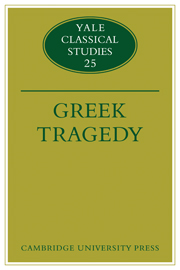Book contents
- Frontmatter
- Contents
- Introduction
- Septem contra Thebas
- The dissembling-speech of Ajax
- The tragic issue in Sophocles' Ajax
- Sophocles' Trachiniae: myth, poetry, and heroic values
- On ‘extra-dramatic’ communication of characters in Euripides
- The infanticide in Euripides' Medea
- The Medea of Euripides
- On the Heraclidae of Euripides
- Euripides' Hippolytus, or virtue rewarded
- Euripides' Heracles
- The first stasimon of Euripides' Electra
- Trojan Women and the Ganymede Ode
- The Rhesus and related matters
On the Heraclidae of Euripides
Published online by Cambridge University Press: 10 January 2011
- Frontmatter
- Contents
- Introduction
- Septem contra Thebas
- The dissembling-speech of Ajax
- The tragic issue in Sophocles' Ajax
- Sophocles' Trachiniae: myth, poetry, and heroic values
- On ‘extra-dramatic’ communication of characters in Euripides
- The infanticide in Euripides' Medea
- The Medea of Euripides
- On the Heraclidae of Euripides
- Euripides' Hippolytus, or virtue rewarded
- Euripides' Heracles
- The first stasimon of Euripides' Electra
- Trojan Women and the Ganymede Ode
- The Rhesus and related matters
Summary
This drama, severely criticized years ago by A. W. Schlegel, is, in spite of its apparently simple structure, one of the most problematic of the extant plays. There is a correspondingly large amount of secondary literature, and since there is such a thorough bibliographical survey of this secondary literature in the works by G. Zuntz and R. Guerrini mentioned below, a reference to them here will suffice. There are, however, two inquiries in particular which, we feel, serve, in their radically opposite positions, as the standard-bearers of the much debated issues. Both modified previously extant theses, but they did so in such an impressive way that anyone who wishes to approach the questions anew must begin with them.
One of these inquiries is the ‘Exkurse zu Euripides Herakliden’, which Wilamowitz wrote in his Greifswald period and which he adhered to in essence throughout his work. Long before him, G. Hermann assumed that the Heraclidae had been shortened by the loss of one episode, which he conjectured came at the end of the play. It was an important step when A. Kirchoff decided that this loss occurred inside the play after line 629. But while both scholars suspected an accidental lacuna, Wilamowitz showed that such a precisely circumscribed damage could not conceivably have come about by chance. He argued that the drama had been revised, and that in the revision an episode (following line 629) with the report of Makaria's death and a second strophe-pair were sacrificed.
- Type
- Chapter
- Information
- Greek Tragedy , pp. 227 - 238Publisher: Cambridge University PressPrint publication year: 1977
- 2
- Cited by



